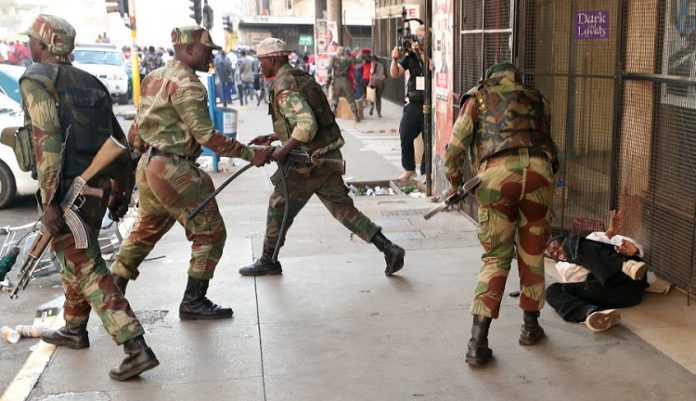
Zimbabwe is back to square one after soldiers were unleashed to keep the peace on the streets of Harare ahead of the electoral commission announcing the name of the elected president. Observers are concerned, but the war veterans say a firm hand was needed.
Ashes in the city centre roads still bear witness to what turned to be deadly protests in Harare on Wednesday, following a peaceful and smooth election process two days before.
Soldiers were out on the streets of Harare on Thursday morning, telling the few who did venture into the CBD for work and business to go home. Some supermarkets were trading, but many shops in Zimbabwe’s capital remained shut, and vendors were not taking any chances.
Three people were shot dead in the protests, and some stalls were burnt.
The Zimbabwe Electoral Commission delivered the last batch of parliamentary results at noon on Thursday, in which Zanu-PF won a two-thirds majority of 145 seats in the National Assembly, while the MDC got 63, the National Patriotic Front (the out-of-favour former Zanu-PF leaders) one, and one seat went to an independent candidate.
The results – assuming they haven’t been grossly rigged – also suggest that demonstrations by opposition supporters in urban Harare were not representative of the feelings of Zimbabweans elsewhere in the country’s rural areas.
The MDC won in 28 of the Harare constituencies, while Zanu-PF got only one seat in the capital, just as in the country’s second city, Bulawayo. There, the MDC got 11 seats. In the rest of Zimbabwe, however, the results were inverted.
It is not clear when the presidential results will be announced, but the electoral commission hinted that it could be tonight or Friday, because these still need to be tabulated. They have until Saturday to make an announcement.
The Commonwealth’s observer mission called on the commission to hurry up, and warned that the post-election violence could undo all the good work done during the elections. Mission head John Mahama Dramani, former Ghanaian president, told a press conference: “The electoral process is yet to be concluded. The greatest test of leadership is called for now. All parties must exercise patience and restraint while we await the announcement of full results.”
He added: “We urge the Zimbabwe Electoral Commission to expedite the announcement of all election results, without further delay.”
Opposition protesters complained that the release of the parliamentary results before the presidential results was a strategy by the electoral commission to lull the population into accepting a loss for MDC Alliance presidential candidate Nelson Chamisa.
Chamisa already announced on Twitter the day after the elections that he was the real winner.
The pro-Zanu-PF Zimbabwe National Liberation War Veterans’ Association (ZNLWVA) disagreed.
Spokesperson Douglas Mahiya told a press conference that the law allowed the electoral commission five days to release the results, and it was still within those five days.
He questioned the motives of those who organised Wednesday’s protests.
“It seems to us the agenda is to block any other candidate to advance the democratic gains other than Chamisa. He has destroyed his legacy, the respect he had for the people.”
Mahiya also implied that Zanu-PF had been doing its homework among the people of Zimbabwe since 1963, when the opposition wasn’t even around, which explained why people loved Zanu-PF better.
He said Chamisa, 40, was too young to know anything about the war. “He never contributed anything significant other than being at the top. He never triggered a gun.”
By Carien Du Plessis•
![]()





























